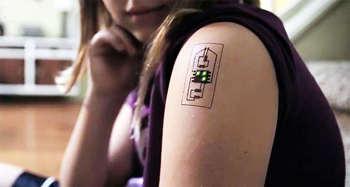Washington, Oct 25: Scientists have created an inexpensive technique to print "data skin" - soft wearable electronics - paving way for smart tattoos that can be customised and printed at home.
 Researchers created a fully functional "data skin" in under an hour. Since the method is based on inexpensive processing tools and materials, the circuits can be produced for less than a dollar.
Researchers created a fully functional "data skin" in under an hour. Since the method is based on inexpensive processing tools and materials, the circuits can be produced for less than a dollar.
When wrapped around the fingertip, a "data skin" embedded with an optical pulse oximetry chip can measure heart rate and blood oxygenation, or can bond to the back of the hand to monitor hand gestures.
After use, the "data skin" can be painlessly peeled from the skin and discarded.
"One of the remaining challenges in skin-mounted electronics is to interface soft circuits with the rigid microchips and electronics hardware required for sensing, digital processing, and power," said Carmel Majidi, professor at Carnegie Mellon University in the US.
"We address this with a breakthrough digital fabrication technique that enables efficient creation of wireless electronics on a soft, water-resistant, medical-grade adhesive," said Majidi.
Electronics produced from this method contain rigid components that are typically seen on a circuit board (such as transistors, microprocessors and power regulators) with soft deformable wiring that stretches and bends.
The method uses commercially available films to create wearable electronics through rapid prototyping and assembly techniques.
Using a combination of laser cutting with alignment control, researchers create individual layers and assemble them through a soft transfer printing technique.
Since the production is fast and inexpensive, users can create their own highly customisable wearable data skins.
"This new and versatile method to print skin-mountable electronics represents a first step towards a fully automated method in which non-experts can create their own customised wearables," said Majidi.
"No longer limited to smartphones and smartwatches, the next generation of personal electronics will be soft, stretchable, and stick to skin or clothing," he said.
"Moreover, they can be produced at home with an inexpensive printer not unlike a desktop laserjet," he added.





Comments
Add new comment